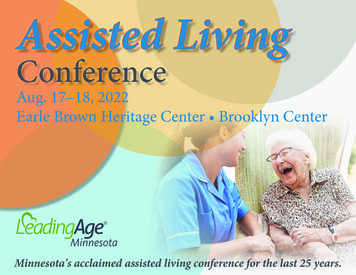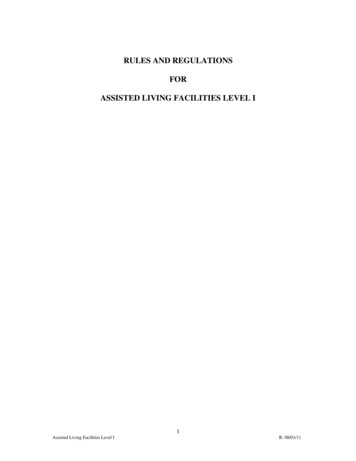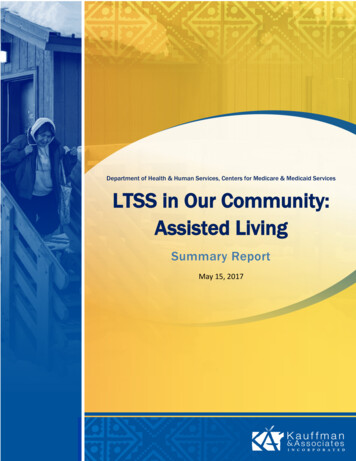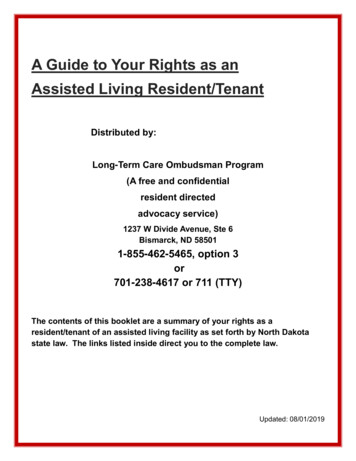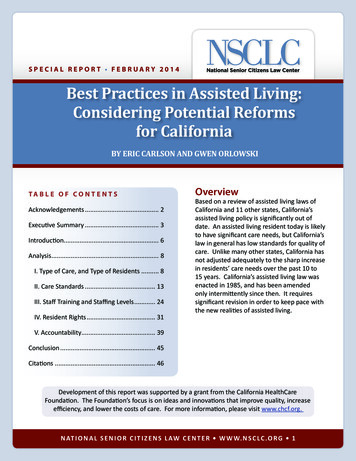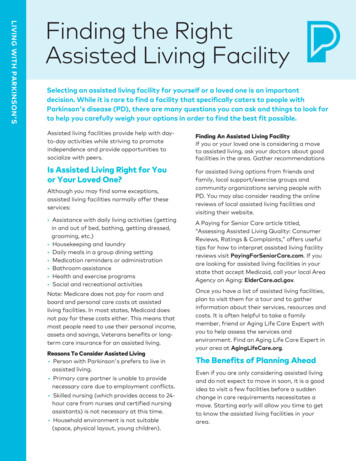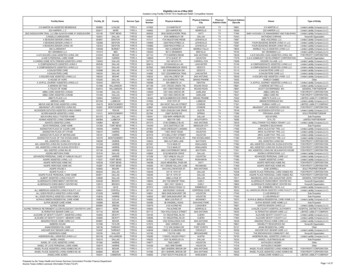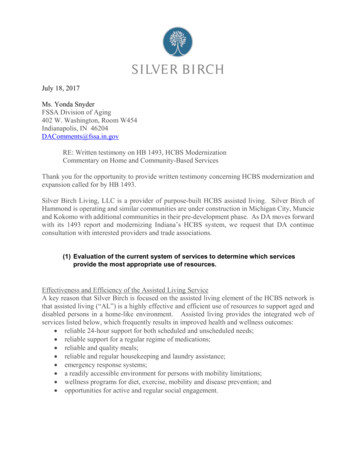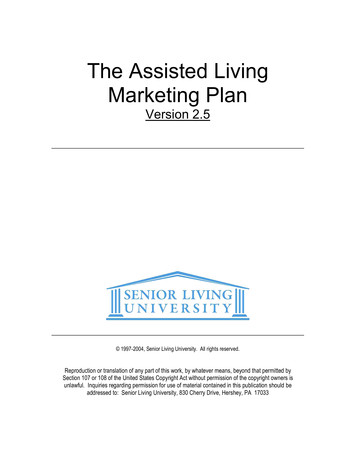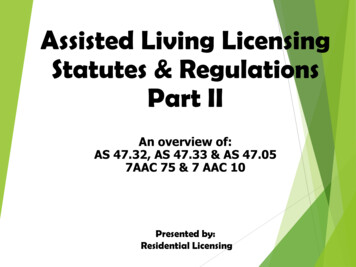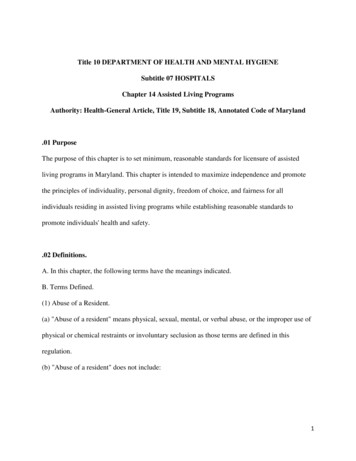
Transcription
Title 10 DEPARTMENT OF HEALTH AND MENTAL HYGIENESubtitle 07 HOSPITALSChapter 14 Assisted Living ProgramsAuthority: Health-General Article, Title 19, Subtitle 18, Annotated Code of Maryland.01 PurposeThe purpose of this chapter is to set minimum, reasonable standards for licensure of assistedliving programs in Maryland. This chapter is intended to maximize independence and promotethe principles of individuality, personal dignity, freedom of choice, and fairness for allindividuals residing in assisted living programs while establishing reasonable standards topromote individuals' health and safety.02 Definitions.A. In this chapter, the following terms have the meanings indicated.B. Terms Defined.(1) Abuse of a Resident.(a) "Abuse of a resident" means physical, sexual, mental, or verbal abuse, or the improper use ofphysical or chemical restraints or involuntary seclusion as those terms are defined in thisregulation.(b) "Abuse of a resident" does not include:1
(i) The performance of an accepted medical procedure ordered by a physician or administered byanother health care practitioner practicing within the scope of the physician or health carepractitioner's license; or(ii) Compliance with a valid advance directive.(2) Activities of Daily Living.(a) "Activities of daily living" means normal daily activities.(b) "Activities of daily living" includes:(i) Eating or being fed;(ii) Grooming, bathing, oral hygiene including brushing teeth, shaving, and combing hair;(iii) Mobility, transfer, ambulation, and access to the outdoors, when appropriate;(iv) Toileting; and(v) Dressing in clean, weather-appropriate clothing.(3) Administration of Medication.(a) "Administration of medication" means the act of preparing and giving a medication to aresident.(b) "Administration of medication" includes:(i) Identifying the time to administer the medication;(ii) Opening the medication container;(iii) Removing the medication from the container; or(iv) Giving the medication to the resident.(c) "Administration of medication" does not include residents who have the cognitive ability torecognize their medications but only require assistance such as:(i) A reminder to take the medication;2
(ii) Physical assistance with opening a medication container; or(iii) Assistance with removing medication from the container.(4) "Adult medical day care" has the meaning stated in Health-General Article, §§14-201 and 14301, Annotated Code of Maryland.(5) "Advance directive" means:(a) A witnessed written document, voluntarily executed by the declarant consistent with therequirements of Health-General Article, Title 5, Subtitle 6, Annotated Code of Maryland; or(b) A witnessed oral statement, made by the declarant consistent with the provisions of theHealth-General Article, Title 5, Subtitle 6, Annotated Code of Maryland.[(6) "Agent" means a person who manages, uses, or controls the funds or assets that legally maybe used to pay an applicant's or resident's share of the costs or other charges for assisted livingservices.][(7)](6)“Alzheimer’s/dementia special care” means the care required by any individual withdementia, including a probable or confirmed diagnosis of Alzheimer’s disease or a relateddisorder, regardless of their placement in the facility.[(8)](7) "Alzheimer's special care unit" means a secured or segregated special unit or programspecifically designed for individuals with dementia, including a probable or confirmed diagnosisof Alzheimer's disease or a related disorder.[(8) "Assessment" means a process of evaluating an individual's health, functional andpsychosocial history, and condition using the Resident Assessment Tool.][(9)] (8) "Assist rail" means a hand rail or other similar, substantially constructed device that isinstalled to enable residents to move safely from one point or position to another.[(10) "Assisted living manager" means the individual who is:3
(a) Designated by the licensee to oversee the day-to-day operation of the assisted living program;and(b) Responsible for the duties set forth in Regulation .15 of this chapter.][(11)] (9) Assisted Living Program.(a) "Assisted living program" means a residential or facility-based program that provides housingand supportive services, supervision, personalized assistance, health-related services, or acombination of these services to meet the needs of individuals who are unable to perform, orwho need assistance in performing, the activities of daily living or instrumental activities of dailyliving, in a way that promotes optimum dignity and independence for the individuals.(b) "Assisted living program" does not include:(i) A nursing home, as defined under Health-General Article, §19-301, Annotated Code ofMaryland;(ii) A State facility, as defined under Health-General Article, §10-101, Annotated Code ofMaryland;(iii) A program licensed or approved by the Department under Health-General Article, Title 7 orTitle 10, Annotated Code of Maryland;(iv) A hospice care program licensed by the Department under Health-General Article, Title 19,Annotated Code of Maryland;(v) Services provided by family members;(vi) Services provided by a licensed residential service agency or licensed home health agency inan individual's own home; or(vii) A Certified Adult Residential Environment Program that is certified by the Department ofHuman Resources under Article 88A, §140, Annotated Code of Maryland.4
[(12)] (10) "Authorized prescriber" means an individual who is authorized to prescribemedications under Health Occupations Article, Annotated Code of Maryland.[(13)] (11)"Background check" means a check of court and other records by a private agency.[(14)] (12)"Bank" means a bank, trust company, savings bank, savings and loan association, orfinancial institution that is:(a) Authorized to do business in this State; and(b) Insured by the Federal Deposit Insurance Corporation.(13) “Case management” means the delegating nurse/case manager’s collaborative process ofassessment, planning, implementation, evaluation, coordination, and monitoring of services tomeet the physical, functional, and psychosocial needs of an individual.[(15)] (14)"Certified medication technician" means an individual who is certified as a medicationtechnician by the Maryland Board of Nursing under COMAR 10.39.04.02.[(16)] (15) "Chemical restraint" means the administration of drugs with the intent of significantlycurtailing the normal mobility or normal physical activity of a resident in order to protect theresident from injuring the resident or others.[(17)] (16) Cognitive Impairment.(a) "Cognitive impairment" means the loss of those thought processes that orchestrate relativelysimple ideas, movements, or actions into goal-directed behavior.(b) "Cognitive impairment" includes lack of judgment, planning, organization, self-control, andthe persistence needed to manage normal demands of the individual's environment.[(18)] (17) "Common-use telephone" means a telephone:(a) That is within the facility;(b) That is accessible to residents;5
(c) That is located so that residents can have private conversations; and(d) With which residents can make local calls free of charge.[(19)] (18) "Contact isolation" means the creation of barriers and other protection such as gloves,masks, or gowns to prevent the spread of an infection by close or direct contact between aninfected individual and others.(19) "Controlled Dangerous Substances (CDS)" means a drug or substance listed in Schedule Ithrough Schedule V as defined in Criminal Law Article, §5-101, Annotated Code of Maryland.(20) "Criminal history records check" means a check of criminal history information, as definedin Criminal Procedure Article, §10-201, Annotated Code of Maryland, by the Department ofPublic Safety and Correctional Services.(21) "Delegating nurse/case manager" means a registered nurse who:(a) Is licensed to practice registered nursing in this State as defined in Health OccupationsArticle, Title 10, Annotated Code of Maryland; and(b) Has successfully completed the Board of Nursing's approved training program for registerednurses, delegating nurses, and case managers in assisted living[.];c) Provides nursing oversight and case management to assure resident clinical needs are met;(d) Provides delegation, supervision, and on-site instruction and guidance to certified nursingassistants, certified medication technicians, and unlicensed direct care staff; and(e) Appropriately assigns nursing tasks to other licensed nursing staff.(22) "Delegation of nursing tasks" means the formal process approved by the Maryland Board ofNursing which permits professional nurses to assign nursing tasks to other individuals if theregistered nurse:(a) Provides proper training, supervision, and monitoring; and6
(b) Retains responsibility for the nursing tasks.(23) "Department" means the Department of Health and Mental Hygiene.(24) "Discharge" means releasing a resident from an assisted living program, after which thereleasing program no longer is responsible for the resident's care.(25) "Emergency admission" means the temporary admittance of an individual in an assistedliving program when the individual's health and safety would be jeopardized by not permittingimmediate admittance.(26) "Facility" means the physical plant in which an assisted living program is operated.(27) Facilitating Access.(a) "Facilitating access" means:(i) Making appropriate referrals for care and treatment;(ii) Arranging for the appointment and involvement of appropriate health care decision makers,when necessary; and(iii) Facilitating contact between the resident, the resident's representative, health care or socialservice professional, and needed services.(b) "Facilitating access" does not mean guaranteeing payment for services that:(i) Are not covered by the resident agreement; or(ii) Cannot be paid for by the resident or the resident's [agent.] representative.(28) "Family council" means a group of individuals who work together to protect the rights ofand improve the quality of life of residents of an assisted living program.(29) "Financial exploitation" means the misappropriation of a resident's assets or income,including spending the resident's assets or income:7
(a) Against the will of or without the consent of the resident or the resident's [agent]representative; or(b) For the use and benefit of a person other than the resident, if the resident or [agent] resident’srepresentative has not consented to the expenditure.(30) "Frequent" means occurring or appearing quite often or at close intervals, but notcontinuously.(31) "Health care practitioner" means an individual who provides health care services and islicensed under Health Occupations Article, Annotated Code of Maryland.(32) "Health condition" means the status of a resident's physical, mental, and psychosocial wellbeing.(33) "Home health services" means those services provided under the provisions of HealthGeneral Article[, §19-404, Annotated Code of Maryland, and COMAR 10.07.10.] §§19-401 and19-4A-01.(34) "Household member" means an individual living in an assisted living facility who is not aresident or staff member.(35) "Incident" means:(a) The death of a resident from other than natural causes;(b) The disappearance or elopement of a resident;(c) An assault on a resident resulting in injury;(d) An injury to a resident which may require treatment by a health care practitioner, or an eventsuch as a fall which could subsequently require treatment;(e) Abuse of a resident;(f) An error or omission in medication or treatment which may result in harm to the resident; or8
(g) An emergency situation or natural disaster.(36) "Informal dispute resolution (IDR)" means an informal process that provides a licensee theopportunity to question the Department about deficiencies cited on a recent inspection.(37) "Instrumental activities of daily living" means home management skills, such as shoppingfor food and personal items, preparing meals, or handling money.(38) "Intensive" means highly concentrated.(39) "Interim medication" means medication stored at the assisted living facility with theintention of expediting immediate initiation of emergency or nonemergency dosing until thepharmacy is able to provide a regular supply.[(39) "Intermittent nursing care" means nursing care which is provided episodically, irregularly,or for a limited time period.](40) Involuntary Seclusion.(a) "Involuntary seclusion" means the separation of a resident from others or from the resident'sroom against the resident's will or the will of the resident's representative.(b) "Involuntary seclusion" does not mean separating a resident from other residents on atemporary and monitored basis.[(41) "Lavatory" means a basin used to maintain personal cleanliness that has hot and coldrunning water and sanitary drainage.][(42)] (41) "Law enforcement agency" means the Maryland State Police or a police agency of acounty or municipal corporation.[(43)] (42) "License" means a document issued by the Secretary to operate an assisted livingprogram in Maryland.9
[(44)] (43) "Licensed pharmacist" means an individual who is authorized to practice pharmacyunder Health Occupations Article, Title 12, Annotated Code of Maryland.[(45)] (44) "Licensee" means the person, association, partnership, or corporation to whom alicense is issued.[(46)] (45) "Management firm" means an organization, under contract with an applicant for alicense or a current licensee, that is intended to have or has full responsibility and control overthe day-to-day operations of the assisted living program.(46) "Manager" means the individual who is:(a) Designated by the licensee to oversee the day-to-day operation of the assisted livingprogram; and(b) Responsible for the duties set forth in Regulation .15 of this chapter.(47)“Medical Orders for Life-Sustaining Treatment (MOLST) form" means the form required tobe developed pursuant to Health-General Article, §5-608.1, Annotated Code of Maryland.[(47)] (48) "Medical record" has the meaning stated in Health-General Article, §4-301,Annotated Code of Maryland.[(48)] (49) "Mental abuse" means an intentional course of conduct resulting in emotional harm.[(49)] (50) "Minimal" means the least amount required to produce the desired result.(51) "Neglect" means depriving a resident of adequate food, clothing, shelter, supervision,essential medical treatment, or essential rehabilitative therapy.(52) “Nursing assessment” means an assessment completed by a registered nurse that:(a) Is comprehensive, systematic, and ongoing;(b) Is the foundation for the analysis of data to determine:(i) Nursing diagnoses;10
(ii) Expected resident outcomes; and(iii) The resident plan of care;(c) Includes but is not limited to:(i) Extensive initial and ongoing collection of resident data;(ii) Past history, current health status, and potential changes to the resident's condition;(iii) Identification of alterations to the resident's previous condition; and(iv) Synthesis of biological, psychological, spiritual, and social aspects of the resident'scondition.[(51)] (53) Nursing [Overview] Oversight.(a) "Nursing [Overview] Oversight" means a process by which a registered nurse assures that thehealth and psychosocial needs of the resident are met.(b) "Nursing [Overview] Oversight" includes:(i) Observation;(ii) Assessment;(iii) Staff education; and(iv) The development, implementation, and evaluation of a resident's service plan.[(52)] (54) "Occasional" means occurring from time to time, on an infrequent or irregular basis,with no particular pattern.[(53)] (55) "Office of Health Care Quality (OHCQ)" means the Office of Health Care Quality ofthe Department of Health and Mental Hygiene.[(54)] (56) "Ongoing" means continuing over an extended period of time.[(55)] (57) “Permanent intravenous access device” means an access device that is not temporaryin nature and is secured in place by a means such as suturing or implantation under the skin.11
[(55)] (58) "Person" means an individual, receiver, trustee, guardian, personal representative,fiduciary, or representative of any kind and any partnership, firm, association, corporation, orother entity.[(56)] (59) "Personal representative" means an individual appointed by the court with the dutiesand authority to settle and distribute the estate of the decedent.(60) "Personal care services" includes, but is not limited to, the range of assistance needed by aresident to complete activities of daily living.[(57)] (61) "Physical abuse" means the sustaining of any physical injury or pain to a resident as aresult of cruel or inhumane treatment, or as a result of a malicious act by any individual.[(58)] (62) Physical Restraint.(a) "Physical restraint" means the use of a device or physical action to prevent, suppress, orcontrol head, body, or limb movement, that cannot be readily and easily removed by the resident.(b) "Physical restraint" does not mean a protective device as defined in this regulation.[(59)] (63) "Plan of correction" means a written response from the assisted living program thataddresses each deficiency cited as a result of an inspection by the Department.(64) "Program" means an assisted living program.[(60)] (65) "Protective device" means any device or equipment, except bed side rails:(a) That:(i) Shields a resident from self-injury;(ii) Prevents a resident from aggravating an existing physical problem; or(iii) Prevents a resident from precipitating a potential physical problem;(b) That may limit, but does not eliminate, the movement of the resident's head, body, or limbs;and12
(c) That is prescribed by a physician.[(61)] (66) "Quality assurance" means a system for maintaining professionally acceptablestandards of care by:(a) Identifying opportunities to improve;(b) Studying problems if any, and their root causes; and(c) Implementing and monitoring interventions to ensure the intended improvement is achievedand sustained.[(62)] (67) "Relief personnel" means qualified individuals who have been hired to substitute forstaff members:(a) In emergency situations; or(b) When the [assisted living] manager or other staff is absent from the program for extendedhours.[(63)] (68) "Representative" means a person referenced in Regulation [.34] .30 of this chapter.[(64)] (69) "Resident" means an individual 18 years old or older who requires assisted livingservices.[(65)] (70)"Resident agreement" means a document signed by both the resident or the resident'sagent and the assisted living manager, or designee, stating the terms that the parties agree to,including, at a minimum, the provisions set forth in Regulations [.24] .20 and [.25] .21 of thischapter.[(66)] (71) ["Resident Assessment Tool"means Maryland's Assisted Living Resident Assessmentand Level of Care Scoring Tool (DHMH Form 4506) that is:] Resident Assessment Tool.(a)”Resident Assessment Tool” means Maryland’s Assisted Living Resident Assessment Tool(DHMH Form XXXX) that is:13
[(a)] (i) Incorporated by reference in Regulation .03 of this chapter; and[(b)] (ii) Used by assisted living facilities to assess the current health, physical, and psychosocialstatus of prospective and current residents.(b) “Resident Assessment Tool” does not include or replace a nursing assessment.[(67)] (72) Restraint.(a) "Restraint" means any chemical restraint or physical restraint as defined in §B(16) and (58) ofthis regulation.(b) "Restraint" does not include a protective device.[(68)] (73) "Sanction" means a disciplinary penalty imposed for a violation of statutes orregulations relating to the operation of an assisted living program, including but not limited to,those penalties referenced in Regulations [.56, .57, .60, .62, and .63] .51, .52, .55., 57, and .58 ofthis chapter.[(69)] (74) "Secretary" means the Secretary of Health and Mental Hygiene, or the Secretary'sdesignee.[(70)] (75) "Self-administration of medication" means a resident having the cognitive andphysical ability to take medication as prescribed by an authorized prescriber:(a) At the correct time;(b) By the correct route; and(c) In the correct dosage.[(71) "Service plan" means a written plan developed by the licensee, in conjunction with theresident and the resident's representative, if appropriate, which identifies, among other things,services that the licensee will provide to the resident based upon the resident's needs asdetermined by the Resident Assessment Tool.]14
(76) "Service plan" means a written plan incorporated by reference in Regulation .03 of thischapter that is developed by the licensee, in conjunction with the resident or resident'srepresentative which identifies, among other things, services that the licensee will provide to theresident based upon the resident's needs as determined by the:(a) Resident Assessment Tool; and(b) Nursing Assessment.[(72)] (77) "Sexual abuse" means a crime listed in Criminal Law Article, Title 3, Subtitle 3,Annotated Code of Maryland.[(73)] (78) ["Short-term residential care" means a stay, either continuous or intermittent, in anassisted living program of not more than 30 days from the date of initial admission, which cannotexceed 30 days per year.] "Short-term residential care" means a stay in an assisted livingprogram of not more than 30 consecutive days from the date of initial admission.[(74)] (79) Significant Change of Condition.(a) "Significant change of condition" means a shift in a resident's health, functional, orpsychosocial conditions that either causes an improvement or deterioration in a resident'scondition as described in Appendix A of the Resident Assessment Tool.(b) "Significant change of condition" does not include any ordinary, day-to-day fluctuations inhealth status, function, or behavior, or an acute short-term illness, such as a cold, unless thesefluctuations continue to recur.[(75)] (80) "Staff" means supervisors, assistants, aides, or other employees, includingindependent contractors retained by an assisted living program, to provide the care and servicesrequired by this chapter.15
(81) “Stage four pressure ulcer” means a localized injury to the skin and underlying tissue, as aresult of pressure, which involves full thickness tissue loss with exposed bone, tendon or muscle,which often includes undermining and tunneling, and may include slough or eschar on someparts of the wound bed.(82) “Stage three pressure ulcer” means a localized injury to the skin and underlying tissue, as aresult of pressure, which involves full thickness tissue loss that does not expose bone, tendon ormuscle and may include undermining, tunneling, and slough which does not obscure the depth oftissue loss.[(76)] (83) "Substantial" means considerable in importance, degree, amount, frequency, orextent.[(77)] (84) "Treatment" means medical or psychological management to cure or improve adisease or condition.[(78)"Unclaimed deceased resident" means a resident of an assisted living program:(a) Who has not prearranged and prepaid for the disposal of the resident's body; or(b) For whom no individual has claimed the body and assumed funeral or burial responsibility.][(79)] (85) "Verbal abuse" means the use of any oral or gestured language that includesdisparaging or derogatory terms, which is directed to a resident, or within a resident's hearingdistance, regardless of the resident's age, ability to comprehend, or disability.03 Incorporation by Reference.In this chapter, the following documents are incorporated by reference:16
A. Maryland's Assisted Living Resident Assessment [and Level of Care Scoring] Tool, DHMHForm [#4506, November 2006], XXXX, June 2012, Maryland Department of Health and MentalHygiene, Office of Health Care Quality;B. Maryland Assisted Living Program Uniform Disclosure Statement, DHMH Form # 4662,[November 2006] February 2009, Maryland Department of Health and Mental Hygiene, Officeof Health Care Quality;C. Maryland Assisted Living Service Plan, DHMH Form # XXXX, June 2012, MarylandDepartment of Health and Mental Hygiene, the OHCQ;[C.] D. 42 CFR §§484.18, 484.30, and 484.32;[D.] E. Guidelines for Preventing the Transmission of Mycobacterium Tuberculosis in HealthCare Facilities, which is incorporated by reference in COMAR 10.07.02.01-1;F. Application for Controlled Dangerous Substances Registration, DHMH Form #XXXX, May2012, Maryland Department of Health and Mental Hygiene, Division of Drug Control;[E.] G. The Life Safety Code, NFPA 101, which is incorporated by reference in COMAR29.06.01; and[F.] H. The State Fire Prevention Code, which is incorporated by reference in COMAR 29.06.01.04 License Required.A. A person may not operate an assisted living program in this State without obtaining a licensefrom the Secretary and complying with the requirements of this chapter.B. Providing housing under a landlord-tenant arrangement does not, in and of itself, exclude aperson from the licensure requirements of this chapter.17
C. Separate Licenses Required. Separate licenses are required for assisted living programs thatare maintained on the same or separate premises, even though the programs are operated by thesame person.D. The Secretary shall issue a license for a specified number of beds [and a specified level ofcare. A licensee may not provide services beyond its licensed authority].E. A program shall include residents admitted for short-term residential care and familymembers who are cared for by program staff in the program’s census, which shall not exceed thelicensed number of beds.F. A licensee may not provide services beyond its licensed authority.[E.] G. The Secretary may issue a joint license with a local health department under this chapter.[F. Posting of License. An assisted living] (H.) A program shall conspicuously post its license atthe facility.[G.] (I) Failure to comply with this chapter and any other applicable State and local laws andregulations is grounds for sanctions, as specified in Regulations [.56—.64] .51—.59 of thischapter.[.05 Levels of Care.][.06] .05 Restrictions.A. Nomenclature about Additional Appropriate Licensure. An assisted living program licensedunder this chapter may not use in its title or advertising the words "hospital", "sanitarium","nursing", "convalescent", "rehabilitative", "sub-acute", or "hospice".B. Advertising.18
(1) Prohibited Terms. A person operating an assisted living program may not use the term"assisted living" in its advertising without being licensed as an assisted living program by theDepartment.(2) Misleading or False Advertising.(a) A person may not advertise, represent, or imply to the public that an assisted living programis authorized to provide a service that the program is not licensed, certified, or otherwiseauthorized by the Department to provide when the license, certificate, or authorization isrequired under this chapter.(b) A person may not advertise an assisted living program in a misleading or fraudulent manner.C. Drop-In or Day Services. An assisted living program may not provide day, partial, or hourlyadult day care services without appropriate adult medical day care licensure. However, anindividual who has applied for admission or who has been admitted to the assisted livingprogram may, for a reasonable period of time not to exceed 30 days, transition to the program inincrements of partial days before becoming a resident. All regulations of this chapter apply toservices and care provided during this transition period.D. An assisted living program dually licensed as an adult medical day care program or anyother licensed program must meet all requirements for both programs. One program’s activitiesshall not infringe upon the operation of the other program.[D.] E. A person who falsifies or alters an assisted living license shall be subject to referral forcriminal prosecution and imposition of civil fines.[.07] .06 Licensing Procedure.A. Application for License.19
(1) To obtain and maintain a license, an applicant shall meet all of the requirements of:(a) This chapter;(b) Other applicable federal, State, and local laws and regulations; and(c) Health-General Article, §19-311, Annotated Code of Maryland, if the program providesservices to 17 or more residents.(2) An applicant shall submit:(a) An application on a form developed by the Department;(b) The completed Uniform Disclosure Statement on a form developed by the Department; and(c) A nonrefundable license fee.(3) Fees. The annual license fee schedule for [assisted living] programs is as follows:(a) 1—3 beds: 100;(b) 4—15 beds: 150; and(c) 16 or more beds: 150 plus 8 per bed for each bed over 15.(4) If a facility fails to comply with the regulations of this chapter and requires the Department toconduct more than one on-site pre-licensure visit, the Department may:(a) Charge 250 per additional on-site visit; or(b) Deny the license.(5) If a facility fails to file a timely renewal application, the facility shall pay a late fee of 10per day, which shall begin accruing on the license’s expiration date, in addition to the renewalfee.[(5)] (6) At a minimum, the applicant shall provide:(a) Verification that the applicant or corporate representative is 21 years old or older;20
(b) Documentation of any prior denial, suspension, or revocation of a license or certification toprovide care to third parties;(c) Identification of any individual or corporate owner of 25 percent or more interest in theassisted living program;(d) Signed disclosure form, provided by the Department, of any previous convictions and[D]documentation of any conviction [and current criminal background check or criminal historyrecords check] of the owner, applicant, [assisted living] manager, alternate [assisted living]manager, other staff, and any household member;(e) Ownership information as specified on an addendum to the application;(f) Verification that the facility is owned, leased, or otherwise under the control of
(a) Designated by the licensee to oversee the day-to-day operation of the assisted living program; and (b) Responsible for the duties set forth in Regulation .15 of this chapter.] [(11)] (9) Assisted Living Program. (a) "Assisted living program" means a residential or facility-based program that provides housing
